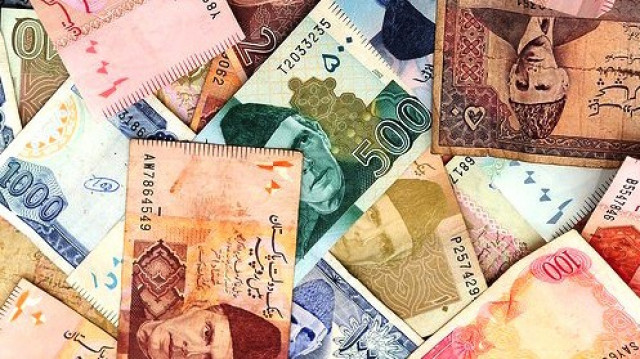Central bank keeps the government afloat
After a delay in disbursements under Coalition Support Fund, govt borrows Rs185b from SBP.

The government borrowed this money over the past three and half months.
This validates assertions of economists who believe that heavy government borrowings have rendered SBP’s bid to control inflation by making loans expensive ineffective. The central bank recently increased interest rate by 50 basis points, raising it to 13.5 per cent, saying that the move was aimed at arresting inflation.
“We are trying to control this borrowing. But after all, the government is sovereign,” said Kardar.
He said rupee was under constant pressure because of high inflation, especially by the surge in prices of food items. The pressure could be eased by controlling inflation and by using interest rate as a tool. At the moment, he said, the central bank is not considering to revise upward the inflation projection.
The central bank has projected that because of floods, inflation would remain around 13.5 per cent by the end of the year.
Kardar said the US has yet to reimburse $2.5 billion against the Coalition Support Fund (CSF), which has created problems for the government in the wake of rising spending to offset impact of floods. “Irrespective of delay in disbursements, the security spending is on the rise, forcing the government to borrow from the central bank,” he added.
During the first three months, the government spent Rs274 billion more than what it earned. Pakistan charges for services it provides to the US and the international coalition forces in Afghanistan on account of “war on terror”.
Officials in the finance ministry say disbursements under this head continued without any trouble till 2007, but as Pakistan’s political and economic situation started deteriorating, the US, too, started withholding a portion of bills claimed by Islamabad.
Kardar said tax revenues were also declining, further squeezing the financing line. Tax collection fell short of the target by Rs46 billion during the first quarter (July-September) of the current fiscal year. He said the State Bank of Pakistan Amendment Act of 2010 would be tabled in the National Assembly in November which would help check the borrowing trend.
The bill stipulates that the government cannot borrow more than 10 per cent of the last year’s tax revenue collection at any time and it will have to retire the debt stock of Rs1.3 trillion within five years of the passage of the bill from the Parliament.
“In order to discourage borrowings, the central bank has clearly told provincial governments that it will not lend them more than their six-week wage requirements. Punjab can borrow a maximum of Rs37.2 billion, Sindh Rs15 billion and Khyber-Pakthunkhwa Rs10.1 billion.
Without specifying, the governor said that the central bank has recently bounced back a cheque from a provincial government, as its encashment could lead to a breach of the set limit.
Acting upon the Supreme Court’s directives, Kardar said, the central bank has convened a meeting of the chief executives of commercial banks which waived loans. The Supreme Court recently ordered that over Rs50 billion in written off loans be recovered.
Kardar said it was incorrect to say that the central bank’s circular No 29 provided an opportunity to the banks to write off loans, as most loans were not covered under the circular, as was evident from the list.
Published in The Express Tribune, October 24th, 2010.



















COMMENTS
Comments are moderated and generally will be posted if they are on-topic and not abusive.
For more information, please see our Comments FAQ